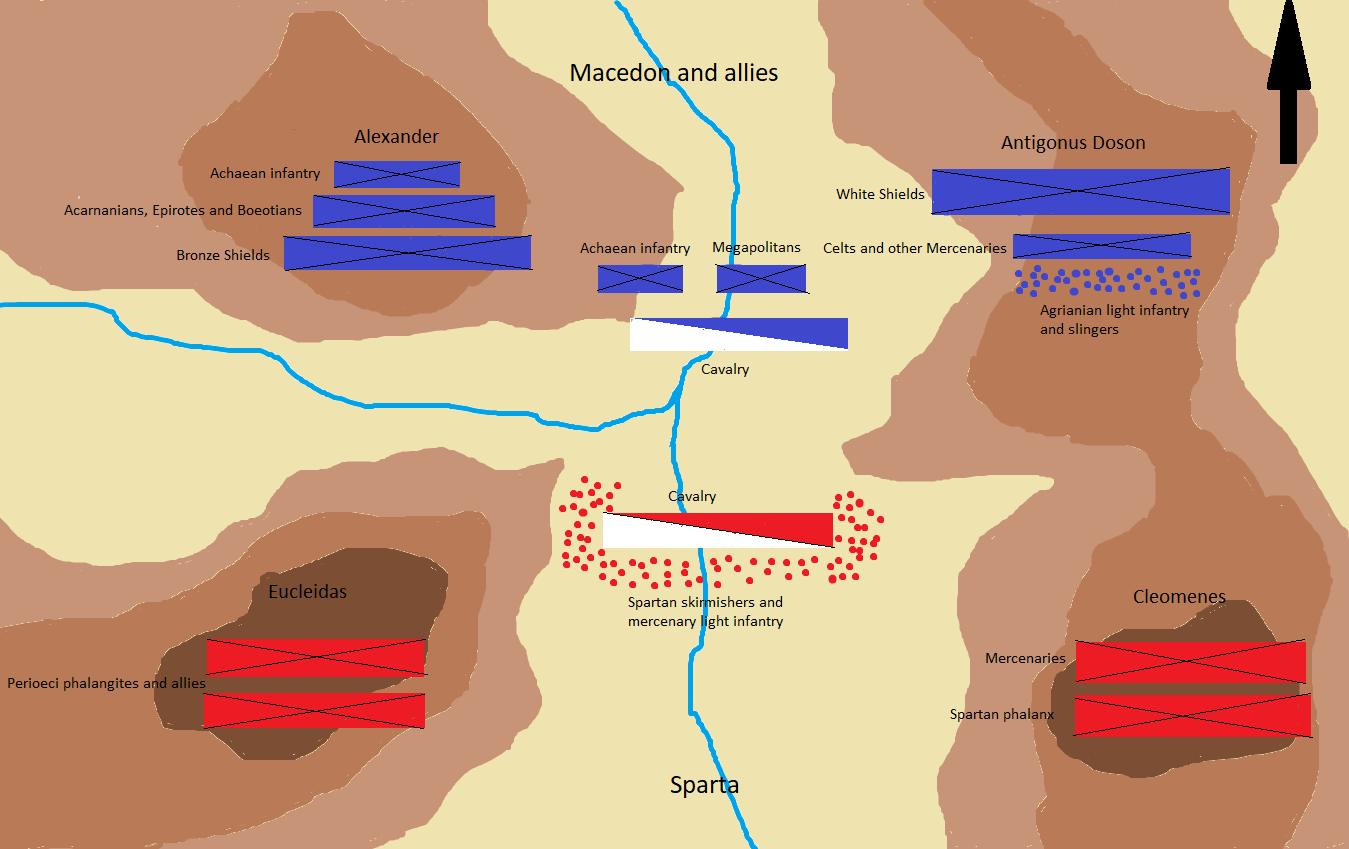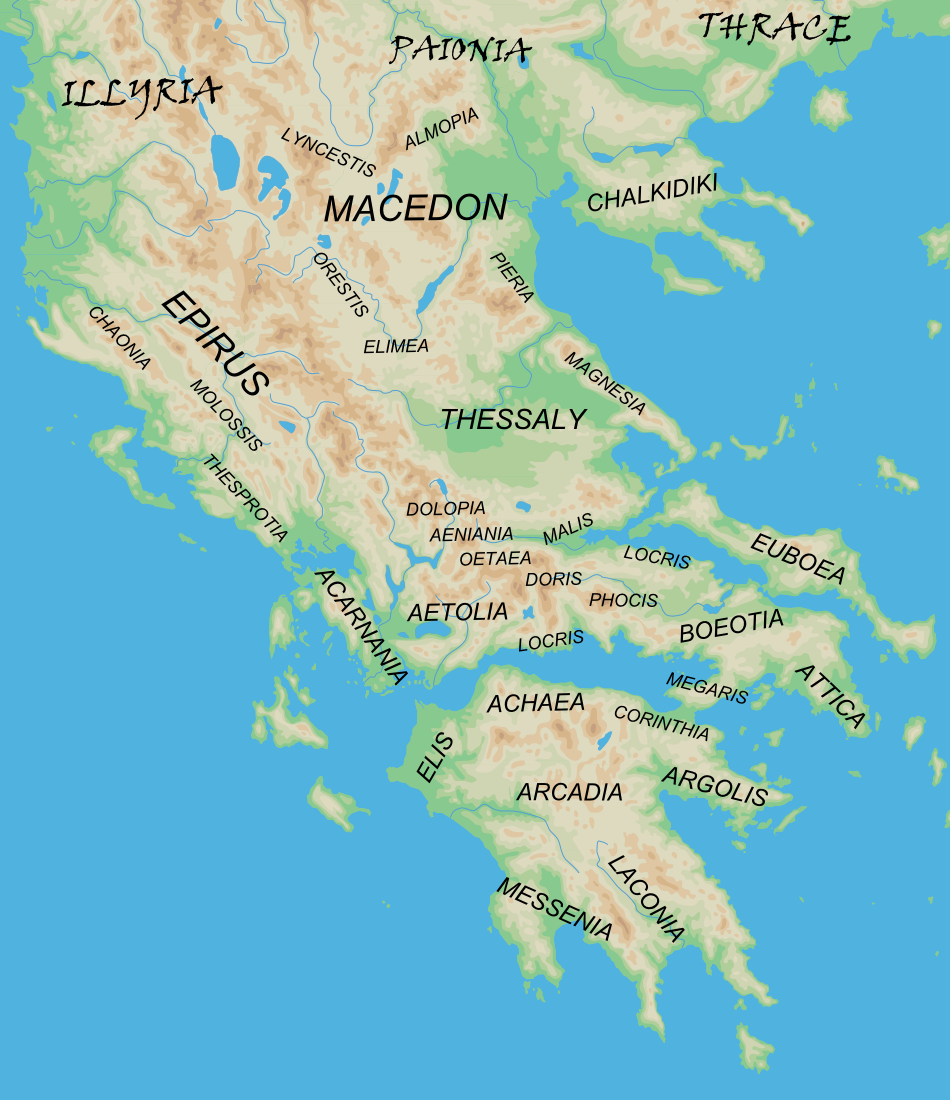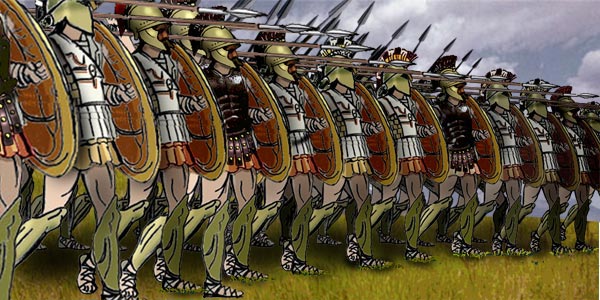|
Battle Of Sellasia
The Battle of Sellasia took place during the summer of 222 BC between Macedon and the Achaean League, led by Antigonus III Doson, and Sparta under the command of King Cleomenes III. The battle was fought at Sellasia on the northern frontier of Laconia and ended in a Macedonian-Achaean victory. In 229 BC, Cleomenes initiated hostilities against the Achaean League, the dominant power of the Peloponnese. In a series of campaigns, Cleomenes was successful in defeating the Achaeans, making Sparta the main regional power. This prompted the chief figure of the Achaean League, Aratus of Sicyon, to approach the King of Macedon, Antigonus III Doson, for military assistance. The Macedonians acquiesced on the terms that the Achaean surrender the formidable fortress of Acrocorinth to them. The Macedonians invaded the Peloponnese in 224 BC at the head of a Greek alliance and by 222 BC managed to hem Cleomenes in Laconia. In the summer of 222 BC, the Macedonian and Achaean army advanced to S ... [...More Info...] [...Related Items...] OR: [Wikipedia] [Google] [Baidu] |
Cleomenean War
The Cleomenean WarPolybius. ''The Rise of the Roman Empire'', 2.46. (229/228–222 BC) was fought between Sparta and the Achaean League for the control of the Peloponnese. Under the leadership of king Cleomenes III, Sparta initially had the upper hand, which forced the Achaean League to call for help the Macedonian king Antigonos Doson, who decisively defeated Cleomenes in the battle of Sellasia in 222. In 235 BC, Cleomenes III ( 235–222 BC) ascended the throne of Sparta and began a program of reform aimed at restoring traditional Spartan discipline while weakening the influence of the ephors, elected officials who, though sworn to uphold the rule of Sparta's kings, had by the time of Cleomenes come to wield extraordinary political power in the Spartan system. When, in 229 BC, the ephors sent Cleomenes to seize a town on the border with Megalopolis, the Achaeans declared war. Cleomenes responded by ravaging Achaea. At Mount Lycaeum he defeated an army under Aratus of Sicyon ... [...More Info...] [...Related Items...] OR: [Wikipedia] [Google] [Baidu] |
222 BC
__NOTOC__ Year 222 BC was a year of the pre-Julian Roman calendar. At the time it was known as the Year of the Consulship of Marcellus and Calvus (or, less frequently, year 532 ''Ab urbe condita''). The denomination 222 BC for this year has been used since the early medieval period, when the Anno Domini calendar era became the prevalent method in Europe for naming years. Events By place Roman Republic * The Roman consuls Marcus Claudius Marcellus and Gnaeus Cornelius Scipio Calvus march into Insubres territory and besiege Acerrae, an Insubre fortification on the right bank of the River Adda between Cremona and Laus Pompeia. The Insubres are unable to relieve Acerrae because the Romans control all the strategic points around it. Therefore, they hire 30,000 Gaesatae mercenaries, led by Viridomarus (or Britomartus), who march to Clastidium, an important and strategically situated town, owned by the Marici, a Ligurian tribe allied to the Romans, they start a siege hop ... [...More Info...] [...Related Items...] OR: [Wikipedia] [Google] [Baidu] |
Battle Of Mount Lycaeum
The Battle of Mount Lycaeum was fought between Sparta led by Cleomenes III and the Achaean League commanded by Aratus. It was the first major battle of the Cleomenean War. The battle occurred at Mount Lycaeum on the border of Elis and Arcadia and ended in a Spartan victory. Prelude In 229 BC, Cleomenes III, King of Sparta, initiated a campaign with the aim of extending the regional power of his kingdom.Plutarch. ''Life of Cleomenes'', 4 This was opposed by the major power in the Peloponnese, the Achaean League. In an attempt to curtail the resurgent power of Sparta, the Achaeans led by their strategos, Aratus, unsuccessfully attempted to re-capture the cities of Tegea and Orchomenus.Polybius. ''The Rise of the Roman Empire'', 2.46; Plutarch. ''Life of Cleomenes'', 4; . This failure was made worse when a vastly numerically superior Achaean army commanded by Aristomachos of Argos declined to offer battle to the army of Cleomenes.Plutarch. ''Life of Cleomenes'', 4 Though these fa ... [...More Info...] [...Related Items...] OR: [Wikipedia] [Google] [Baidu] |
Strategos
''Strategos'' (), also known by its Linguistic Latinisation, Latinized form ''strategus'', is a Greek language, Greek term to mean 'military General officer, general'. In the Hellenistic world and in the Byzantine Empire, the term was also used to describe a military governor. In the modern Hellenic Army, it is the highest officer rank. Etymology ''Strategos'' is a compound of two Greek words: ''stratos'' and ''agos''. ''Stratos'' (στρατός) means 'army', literally 'that which is spread out', coming from the proto-Indo-European root *stere-, 'to spread'. ''Agos'' (ἀγός) means 'leader', from ''agein'' (ἄγειν), 'to lead', from the pelasgic root *ag-, 'to drive, draw out or forth, move'. Classical Greece Athens In its most famous attestation, in Classical Athens, the office of ''strategos'' existed already in the 6th century BC, but it was only with the reforms of Cleisthenes in 501 BC that it assumed its most recognizable form: Cleisthenes instituted a boa ... [...More Info...] [...Related Items...] OR: [Wikipedia] [Google] [Baidu] |
Polis
Polis (: poleis) means 'city' in Ancient Greek. The ancient word ''polis'' had socio-political connotations not possessed by modern usage. For example, Modern Greek πόλη (polē) is located within a (''khôra''), "country", which is a πατρίδα (patrida) or "native land" for its citizens. In ancient Greece, the polis was the native land; there was no other. It had a constitution and demanded the supreme loyalty of its citizens. χώρα was only the countryside, not a country. Ancient Greece was not a sovereign country, but was territory occupied by Hellenes, people who claimed as their native language some dialect of Ancient Greek. Poleis did not only exist within the area of the modern Republic of Greece. A collaborative study carried by the Copenhagen Polis Centre from 1993 to 2003 classified about 1,500 settlements of the Archaic and Classical ancient-Greek-speaking population as poleis. These ranged from the Caucasus to Southern Spain, and from Southern Russia to ... [...More Info...] [...Related Items...] OR: [Wikipedia] [Google] [Baidu] |
Regions Of Ancient Greece
The regions of ancient Greece were sub-divisions of the Hellenic world as conceived by the ancient Greeks, shown by their presence in the works of ancient historians and geographers or in surviving legends and myths. Conceptually, there is no clear theme to the structure of these regions. Some, particularly in the Peloponnese, can be seen primarily as distinct geo-physical units, defined by physical boundaries such as mountain ranges and rivers. Conversely, the division of central Greece between Boeotia, Phocis, Doris and the three parts of Locris, seems to be attributable to ancient tribal divisions and not major geographical features. Both types of regions retained their identity throughout the Greek Dark Ages and its tumultuous changes in the local population and culture, giving them a less political and more symbolic presence. Other geographical divisions not identified with the aforementioned areas did, however, change over time, suggesting a closer connection with triba ... [...More Info...] [...Related Items...] OR: [Wikipedia] [Google] [Baidu] |
General
A general officer is an Officer (armed forces), officer of high rank in the army, armies, and in some nations' air force, air and space forces, marines or naval infantry. In some usages, the term "general officer" refers to a rank above colonel."general, adj. and n.". OED Online. March 2021. Oxford University Press. https://www.oed.com/view/Entry/77489?rskey=dCKrg4&result=1 (accessed May 11, 2021) The adjective ''general'' had been affixed to officer designations since the late medieval period to indicate relative superiority or an extended jurisdiction. French Revolutionary system Arab system Other variations Other nomenclatures for general officers include the titles and ranks: * Adjutant general * Commandant-General, Commandant-general * Inspector general * General-in-chief * General of the Air Force (USAF only) * General of the Armies, General of the Armies of the United States (of America), a title created for General John J. Pershing, and subsequently grante ... [...More Info...] [...Related Items...] OR: [Wikipedia] [Google] [Baidu] |
Alexandria
Alexandria ( ; ) is the List of cities and towns in Egypt#Largest cities, second largest city in Egypt and the List of coastal settlements of the Mediterranean Sea, largest city on the Mediterranean coast. It lies at the western edge of the Nile Delta, Nile River delta. Founded in 331 BC by Alexander the Great, Alexandria grew rapidly and became a major centre of Hellenic civilisation, eventually replacing Memphis, Egypt, Memphis, in present-day Greater Cairo, as Egypt's capital. Called the "Bride of the Mediterranean" and "Pearl of the Mediterranean Coast" internationally, Alexandria is a popular tourist destination and an important industrial centre due to its natural gas and petroleum, oil pipeline transport, pipelines from Suez. The city extends about along the northern coast of Egypt and is the largest city on the Mediterranean, the List of cities and towns in Egypt#Largest cities, second-largest in Egypt (after Cairo), the List of largest cities in the Arab world, fourth- ... [...More Info...] [...Related Items...] OR: [Wikipedia] [Google] [Baidu] |
Phalanx
The phalanx (: phalanxes or phalanges) was a rectangular mass military formation, usually composed entirely of heavy infantry armed with spears, pikes, sarissas, or similar polearms tightly packed together. The term is particularly used to describe the use of this formation in ancient Greek warfare, although the ancient Greek writers used it to also describe any massed infantry formation, regardless of its equipment. Arrian uses the term in his ''Array against the Alans'' when he refers to his legions. In Greek texts, the phalanx may be deployed for battle, on the march, or even camped, thus describing the mass of infantry or cavalry that would deploy in line during battle. They marched forward as one entity. The term itself, as used today, does not refer to a distinctive military unit or division (e.g., the Roman legion or the contemporary Western-type battalion), but to the type of formation of an army's troops. Therefore, this term does not indicate a standard combat ... [...More Info...] [...Related Items...] OR: [Wikipedia] [Google] [Baidu] |
Acrocorinth
Acrocorinth (, 'Upper Corinth' or 'the acropolis of ancient Corinth') is a monolithic rock overlooking the ancient city of Corinth, Greece. In the estimation of George Forrest, "It is the most impressive of the acropolis of mainland Greece." With its secure water supply, Acrocorinth's fortress was repeatedly used as a last line of defense in southern Greece because it commanded the Isthmus of Corinth, repelling foes from entry by land into the Peloponnese peninsula. History The Acrocorinth was continuously occupied from archaic times to the early 19th century. Along with Demetrias and Chalcis, the Acrocorinth during the Hellenistic period formed one of the so-called “''Fetters of Greece''” – three fortresses garrisoned by the Macedonians to secure their control of the Greek city-states. The city's archaic acropolis was already an easily defensible position due to its geomorphology; it was further heavily fortified during the Byzantine Empire as it became the seat of the ... [...More Info...] [...Related Items...] OR: [Wikipedia] [Google] [Baidu] |
King Of Macedon
Macedonia, also called Macedon, was ruled continuously by kings from its inception around the middle of the seventh century BC until its conquest by the Roman Republic in 168 BC. Kingship in Macedonia, its earliest attested political institution, was hereditary, exclusively male, and characterized by dynastic politics. Information regarding the origins of the Argeads, Macedonia's founding dynasty, is very scarce and often contradictory. The Argeads themselves claimed descent from the royal house of Argos, the Temenids, but this story is viewed with skepticism by some scholars as a fifth century BC fiction invented by the Argead court "to 'prove' Greek lineage". It is more likely that the Argeads first surfaced either as part of a tribe living near Mount Bermion who, possibly under the authority of Perdiccas, subjugated neighboring or, according to Herodotus, were of a Doric race that originally resided in Pindus.Herodotus. '' Histories'', 1.56.2–3. During their reign, Mac ... [...More Info...] [...Related Items...] OR: [Wikipedia] [Google] [Baidu] |
Aratus Of Sicyon
Aratus of Sicyon (Ancient Greek: Ἄρατος ὁ Σικυώνιος; 271–213 BC) was a politician and military commander of Hellenistic period, Hellenistic Ancient Greece, Greece. He was elected strategos of the Achaean League 17 times, leading the League through numerous military campaigns including the Cleomenean War and the Social War (220-217 BC), Social War. Aratus was exiled to Argos, Greece, Argos at the age of seven, after his father, the magistrate of Sicyon, was killed in a coup. In 251 BC, he led an expedition composed of other exiles which freed Sicyon from tyranny, and assumed power in the city. Sicyon joined the Achaean League, in which Aratus would later be elected ''strategos''. In his first major campaign as strategos, he seized the Macedonia (ancient kingdom), Macedonian-held citadel of Acrocorinth, previously believed impregnable. After conquering the Acrocorinth, Aratus pursued the Achaean League's expansion. When the Spartan king Cleomenes III conquered ... [...More Info...] [...Related Items...] OR: [Wikipedia] [Google] [Baidu] |





